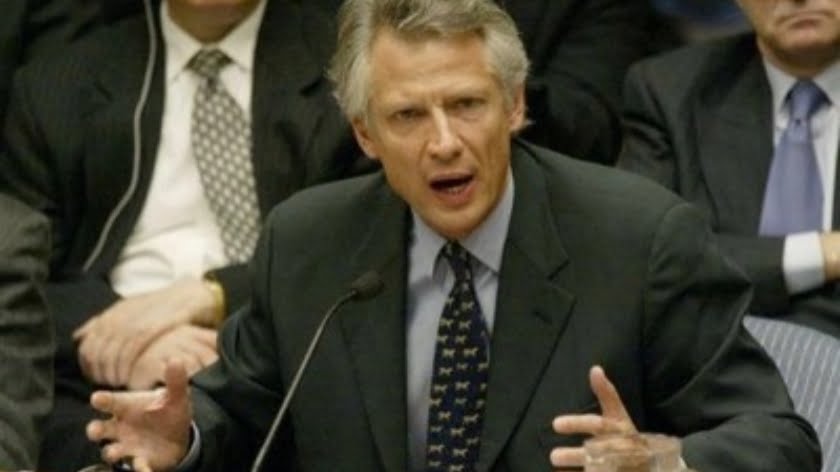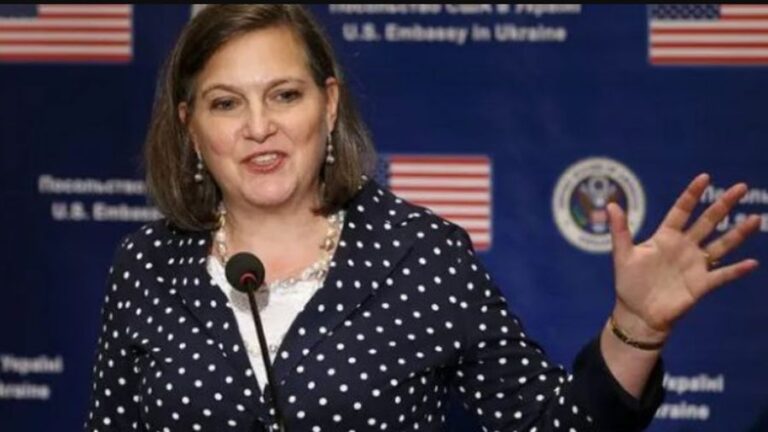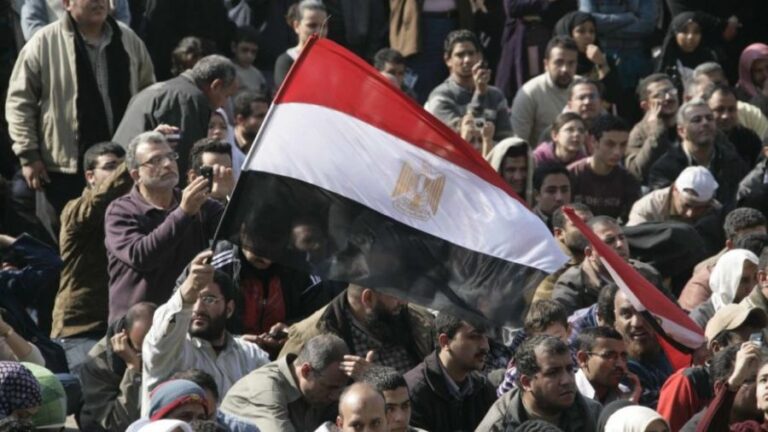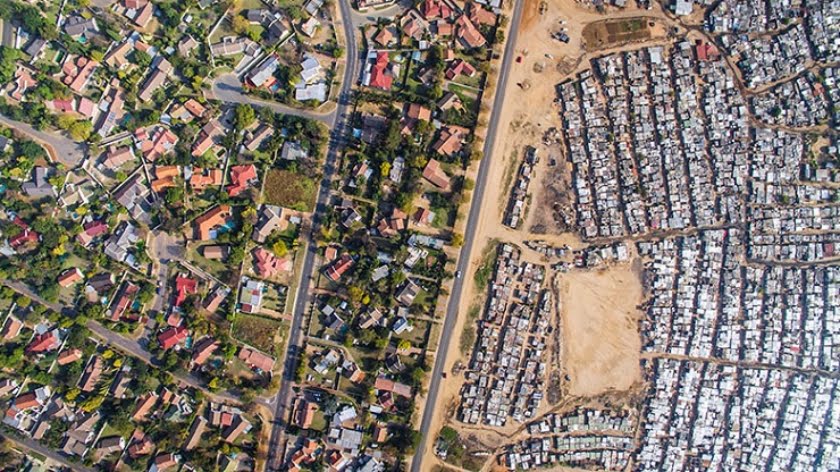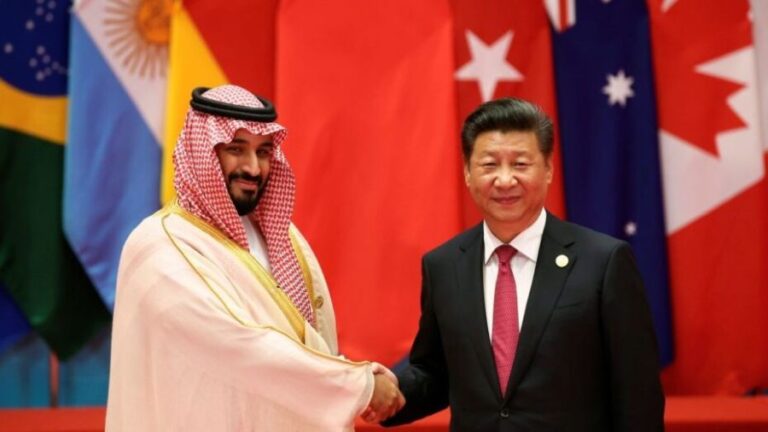The Agony of French Foreign Policy
The « Arab Spring » as seen from Paris
The foreign policies of France, once guided by the strategic vision of Charles de Gaulle, progressively gave way to the hunt by certain people for some easy money. After having first resisted US imperialism, Jacques Chirac later withdrew from the combat and mixed the affairs of state with his own personal interests. Nicolas Sarkozy served the interests of the United States at the same time as he negotiated, for his own benefit, anything he could get his hands on. François Hollande went even further, by placing the Republic at the service of a few private interests which formed the new colonialist party. Always seeking more wealth, the French leaders placed their country successively in the service of Turkey, Qatar, and then Saudi Arabia.
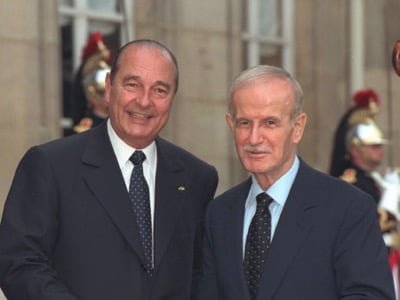
Jacques Chirac, « the Arab »
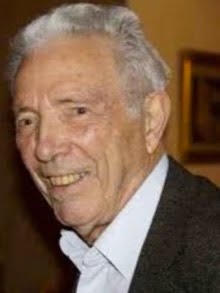
Jacques Chirac held Hafez el-Assad in very high esteem. He saw in him an exceptional personality with a vision for his country and his region.
France had fought him during certain phases of the Lebanese civil war, and publicly accused him of being responsible for the assassination of its ambassador in Beirut, Louis Delamare (1981). The riposte followed immediately, in the form of the terrorist attack ordered by President François Mitterrand against the National Bureau for Military Conscription in Damascus, killing 175.
After the Syrian defeat by Israël in 1967, Hafez el-Assad took power, relying on support from the partisans of Ba’ath and also a number of adventurers, including his own brother Rifaat, who became a regular golf partner of François Mitterrand and the friend of Abdallah, the future King of Saudi Arabia. In 1982, when Rifaat was living between France and Syria, he organised an attack, on the rue Marbeuf in Paris, against the newspaper Al-Watan Al-Arab which had criticised him. His friendship with President Mitterrand smothered the police enquiry however, and his country was accused of the crime in his place. France expelled two Syrian diplomats, including the head of the Intelligence services, Michel Kassoua. But finally, the affair did not weigh on the relations between the two states.
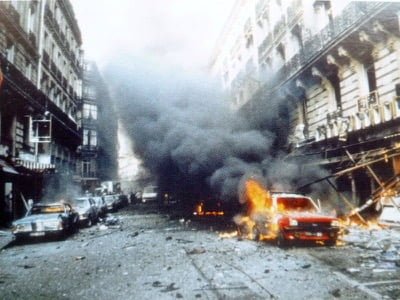
Jacques Chirac was the only foreign head of state present at the funeral of Hafez el-Assad (2000). While a wave of political opposition swept across the land, France, which had banked on Assad being succeeded by Vice-President Abdel Halim Khaddam, finally recognised the Ba’ath party’s designation of Bachar el-Assad as the next President.
Playing the mentor, Jacques Chirac – nicknamed « The Arab » because his authority was so highly considered by the regional heads of state – tried to introduce Bachar to the international stage. But the young man had no intention of allowing himself to be led. Chirac negotiated with the new President in order to gain permission for Total to exploit several of the Syrian oil fields. At the moment of the official call for tender, however, Total’s proposition proved to be outrageously unfavourable. It was nonetheless backed by certain Syrian senior civil servants, including the President’s economic advisor, Nibras el-Fadel, who was quickly revealed as a double agent working for Total and the Syro-British head of Petrofac, Ayman Asfari. Learning of this corruption, Assad sanctioned Total by excluding it from the call for tender, provoking a furious reaction by Chirac.
Jacques Chirac experienced a similar disappointment in Lebanon. In the name of the French Republic, he had negotiated with his personal friend, Prime Minister Rafic Hariri, for the right to explore Lebanese territorial waters for oil. The operation was covered by two heads of the Syrian Peace Force, the head of the Intelligence services, Ghazi Kanaan, and Vice-President Abdel Halim Khaddam. Chirac sent a ship from the Marine Nationale to begin the prospection, but when Lebanese President Emile Lahoud heard about it, he summoned the French ambassador and explained to him that Mr. Hariri’s personal arrangements did not engage his country. The French warship was asked to leave the region.
Reacting to these calls to order, Chirac avoided speaking to the Syrian and Lebanese Presidents.
Jacques Chirac, who had supported the United States in the context of the attacks of 11 September 2001, was worried that he had been deceived after reading my book « The Big Lie » [1]. He ordered the DGSE (Direction Générale de la Sécurité Extérieure) to verify my thesis. After having mobilised several hundreds of civil servants and numerous embassies, the security services replied that they were not in a position to approve the book, but that all the elements that had been available for verification – except for one quote – were exact. Chirac, who knew Saddam Hussein very well, found confirmation in the book that France should not support the Anglo-Saxon attack in the Near East.
The French Minister for Foreign Affairs, Dominique de Villepin, took position against Secretary of State Colin Powell. He had flown in haste to New York, but left the dossier that the DGSE had prepared for him on the desk of his Paris office. No matter, his improvised speech on February 14, 2003 sparked unprecedented applause from the members of the United Nations Security Council, and anger from Washington. de Villepinrefrained from criticising Powell’s gargantuan lies – concerning President Hussein’s alleged support for al-Qaïda and his programme of weapons of mass destruction – but emphasized that nothing justified the war.
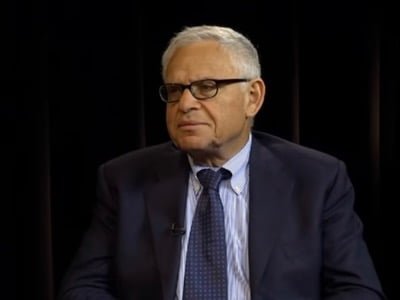
President George W. Bush honoured the G8 summit in Evian with his presence for no more than a few hours. A campaign of « French-bashing » was developing in the United States, and the Pentagon advisor who inspired the coup d’état of September 11, Edward Luttwak, publicly threatened President Chirac, on the France2 TVnews programme. He declared unambiguously – « Chirac has a bill to pay in Washington! He has an expensive bill to pay in Washington. And here in Washington, obviously, we are determined to make him pay that bill. Chirac expected to wine and dine on the diplomatic stage at the expense of the United States, and obviously, he’s going to pay ».
Panicked, Jacques Chirac changed sides, and fell into line with all US initiatives, going as far as to make available his ambassador in Tbilissi, Salome Zourabichvili, as Minister for Foreign Affairs in Georgia during the « Rose Revolution » (December 2003), or participating in the kidnapping of the President of Haïti, Jean-Bertrand Aristide, and having him jailed in the Central African Republic (March 2004) [2].
Following the same line, Jacques Chirac and his friend, billionaire Rafic Hariri, wrote Resolution 1559, demanding the withrawal from Lebanon of the Syrian Peace Force and the disarmament of all Lebanese militias, including Hezbollah and the Palestinian groups. Unlike other militias, which serve a feudal leader, or are sponsored by a foreign state, Hezbollah is a network of resistance to Israëli colonialism inspired by the Iranian Revolution, and was at that time armed by Syria. However, the Resolution was inapplicable unless Lebanon was handed over to the Israëli army. Furthermore, President Chirac decided to boycott his Lebanese counterpart, Emile Lahoud, who was not even invited to the Sommet de la Francophonie (Summit of French-speaking Nations).
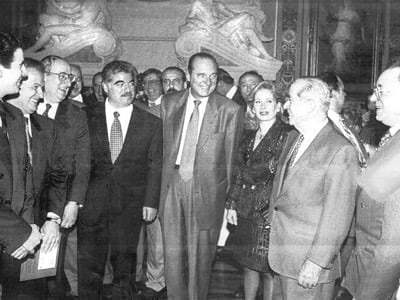
On February 14, Rafic Hariri – who was no longer Prime Minister – was assassinated, allegedly by an explosive charge hidden in a van [3].
Jacques Chirac hurried to Beirut, not to take part in the funeral service, nor even to meet with Lebanese officials, but to spend an entire day with the dead man’s lawyers signing private commercial documents. He then returned to Paris, while the « Cedar Revolution » was at its height in Lebanon, under the discreet supervision of Gene Sharp’s crew, Washington’s Serbian agitators.
Easily influenced, Jacques Chirac shared the certainty that Bachar el-Assad and Emile Lahoud had together plotted the murder of his friend and private business partner, Rafic Hariri. He therefore supported the United Nations Commission charged with investigating the crime instead of the Lebanese Ministry of Justice. Over a period of several years,there followed a number of accusations levelled by the UNO, global ostracism of Bachar el-Assad, and the arrest of the four generals closest to President Emile Lahoud. An international « Tribunal » was created, under the auspices of the Secretary General of the UNO, Ban Ki-moon, but without the approbation of the Lebanese parliament, to try the two Presidents alleged to be responsible for the assassination.
However, Jacques Chirac’s obsessions did not alter Franco-Syrian cooperation. As from 2003, and until the suspension of diplomatic relations in 2012, the Syrian services kept their counterparts informed about young French citizens who wanted to go to Iraq, or who were already fighting there against the US occupation. If by chance some of them transited by Syria, they were arrested and discreetly repatriated to France by military aircraft. This cooperation allowed France to maintain public order and prevent a number of terrorist attacks on its territory. Among the jihadists extradited by Syria was Boubaker al-Hakim (the assassin of Tunisian leader Cokri Belaïd) and Sabri Essid (the half-brother of Mohamed Merah, who was to become an executioner for Daesh). However, not only did France interrupt this relationship during the « Arab Spring », but it also freed the accused due to its alliance with the Muslim Brotherhood.
In any case, as from 2 September 2005, Jacques Chirac ceased to govern. He was the victim of a serious cerebral accident, and was no longer able to execute his functions, even though he would conserve them in appearance. For two years, his government was divided between the Gaullists led by Prime Minister Dominique de Villepin, and the Atlantists led by the Minister of the Interior, Nicolas Sarkozy.
During the Israëli attack on Lebanon in the summer of 2006, Villepin supported Hezbollah, whose disarmament Chirac had demanded. Once his mandate was over, Chirac no longer made any secret of his corruption, and settled into a luxurious apartment made available to him by the Hariri family for his retirement. Supported by Madame Chirac, Sarkozy took over.
Nicolas Sarkozy, the American
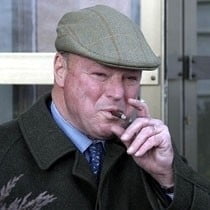
Nicolas Sarkozy was elected President of the French Republic in May 2007, not for his programme, but for his force of will. The French people saw in him the man who would be capable of reviving a dormant, ham-strung country. However, they were unaware that Sarkozy had been raised as an adolescent in New York by his father’s third wife, Christine de Ganay. She had remarried with ambassador Frank Wisner Jr., son of the founder of the CIA/NATO secret services, the Gladio network. It was due to this connection that Sarkozy was sponsored by Washington to become the President of the French Republic [4].
Unlike Jacques Chirac, who had proved to be a brave Gaullist in 2003 before mutating into an unscrupulous wheeler-dealer, Nicolas Sarkozy was considered by Washington to be their agent. He was immediately associated with the projects of the United States.
While he was still Minister of the Interior, Nicolas Sarkozy initiated contact with Abdullah Senussi, the head of Libyan interior secret services, and brother-in-law of Mouamar Kadhafi. Senussi had been found guilty in absentia in France for his role in the 1989 attack on flight 772UTA, which caused 170 deaths. Libya proposed to finance Sarkozy’s electoral campaign in exchange for a promise of amnesty or a legal decision of nolle prosequi (dismissal). One of Sarkozy’s trusted collaborators, Brice Hortefeux, a ministerial delegate, negotiated the amount with Colonel Kadhafi. Finally, according to the senior Libyan official who had supervised the transaction, a Franco-Lebanese businessman, Ziad Takieddine, transported 57 million Euros to Paris.
During the electoral campaign, Libya noticed that the Socialist candidate, Ségolène Royal, also had a chance of winning. Senussi then made contact with the Socialist ex-Minister for Foreign Affairs, Roland Dumas, who – still according to the same source – went to Tripoli to collect 25 million Euros, about half the sum that had been offered to Mme. Royal’s competitor.
French law forbids the financing of electoral campaigns by foreign states. Moreover, the cost of a political campaign is not allowed to attain these sums. Sarkozy and Royal could not promise to fabricate a legal dismissal without over-riding the law and the independence of the Justice system. They could, however, pronounce an amnesty, but were not allowed to negotiate it for the benefit of their own personal affairs. The ex-Minister for Foreign Affairs, Roland Dumas knew this, particularly since he was also the President of the Constitutional Council (1995-2000) charged with verifying the honesty of the election process. The French legal system investigated Sarkozy’s indiscretions, but not those of Mme. Royal [5].
Business between Kadhafi and Sarkozy continued until after he had taken possession of the Elysée. The « first lady » (sic), Cécilia Sarkozy, was charged with putting a term to the misery of five Bulgarian nurses and a Palestinian doctor, who had been imprisoned in Libya for eight years. In 1999, more than 400 children had been contaminated by the AIDS retrovirus in Benghazi hospital. The Islamists accused Mouamar Kadhafi of neglecting the city of Benghazi, and of having plotted to kill their children. The local public prosecutor preferred to accuse the foreign hospital staff in order to exonerate the Guide. He had them brutally tortured to extort their confessions.
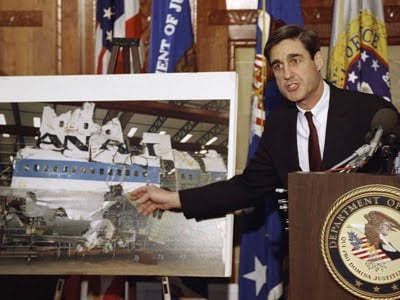
However, Bulgaria, which had just joined the European Union, asked the European Commission to negotiate with Tripoli for the liberation of its citizens. Libya thus found itself face to face with the same officials who had accused it of the 1988 attack on PanAm flight 103, which exploded over Lockerbie (Scotland), causing 270 deaths. Although Mouamar Kadhafi had always denied being implicated in the attack, Libya agreed to compensate the families involved for a total sum of 2.7 billion dollars, as a means of settling the last dispute which opposed him to the Western powers. Aware that he would have to deal with the fantasies of the Islamists, the Guide decided to use the nosocomial infection in Benghazi to recuperate what he had been unjustly forced to pay for Lockerbie. He then demanded that this money be given back in exchange for his withdrawal from certain African states and the freedom of the nurses and the doctor. Finally, the United States paid the sum to Qatar, who in turn paid Libya, under the control of the European Union. Minister for Justice Moustafa Abdel Jalil, a member of the Muslim Brotherhood who had covered up the tortures when he was President of the Court of Appeal in Tripoli, thus came to meet President Sarkozy’s emissaries. As for Cécilia – still according to the same senior Libyan official – she received a proportional gratuity from Libya (2.7 million dollars). Nicolas Sarkozy, who was then in the middle of his divorce proceedings, gave it to her as a present. She could now afford to open a Public Relations Bureau in Qatar with her husband. Bulgaria celebrated the liberation of its citizens, while also frowning on the way the agreement had been reached.
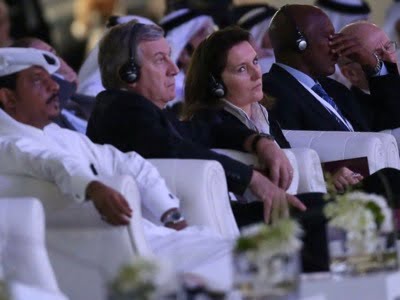
Now that he was « respectable » again, Mouamar Kadhafi undertook a European tour, including a five-day visit to France. He caused a scandal by pitching his tent in the gardens of the Hôtel Marigny, the residence of guests of state. Above all, he declared on France24 that Libya was more democratic than France. The provocation is not as crazy as his listeners thought, as we shall see as this story unwinds – in reality, France is not a democracy, insofar as neither the people nor their representatives are really consulted about any number of decisions, particularly those concerning foreign policy and defence. On the other hand, France was a Republic until the end of Jacques Chirac’s mandate, because until then Power only made decisions based on the President’s perception of the general interest. We shall see that this did not hold true for very long. As for Libya, it was a direct democracy inspired by the experiences of the French utopians of the 19th century. However, this system is also a trap. Indeed, Libyan society is founded on tribal ethnicity, so that personal opinions have little value. It is in fact this social reality which allowed Kadhafi to exercise the function of head of state, while officially, this post does not even exist. The major difference between the two countries lies elsewhere – negotiating with the United States, Libya ceased all intervention in the affairs of its neighbours, while France cheerfully violated the Charter of the United Nations, particularly in Africa, and soon also in the Levant. Above all, Kadhafi proclaimed the emancipation of all human beings and ended slavery, while France – which has not practised slavery on its own territory since 1848 – has no problem allying itself with slave states like Saudi Arabia and Qatar.
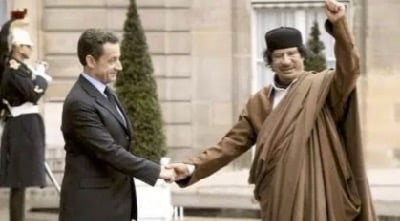
President Sarkozy’s first act concerning Syria, in March 2008, was to organise the flight of the most important false witness in the Hariri affair, Mohammed Zuhair al-Siddiq, who was given a fake Czech passport [6]. Certainly, the accusations of murder against Emile Lahoud and Bachar el-Assad collapsed, but the identity of the real organiser of this masquerade remained a mystery. As if butter wouldn’t melt in his mouth, Sarkozy made an official visit to Damascus to reboot the relations between the two countries and to ensure that Syria would no longer intervene in the political affairs of Lebanon.
In May, the Prime Minister of Lebanon (and agent of the Jordanian secret services), Fouad Siniora, opened hostilities with Hezbollah. He attempted to neutralise the air bridge between Iran and the Resistance as well as his own internal communications system, so that the United States and Saudi Arabia could take control of the country and attack Syria. But Hezbollah attacked first. Within a few hours, Siniora’s security system collapsed, and he was obliged to retreat.
Peace negotiations opened in Doha. Qatar and France imposed a new President in Lebanon, which had none since the end of Emile Lahoud’s mandate six months earlier. Paris chose the Chief of Staff, General Michel Sleimane, because he was easily manipulable. Sleimane had in fact presented false documents in an attempt to obtain double French nationality for himself and his family. The affair was ongoing in the courts. His designation as President of Lebanon left this problem hanging over his head like the sword of Damocles. Worried about Syria’s possible reaction to this affair, Qatar offered President Assad – who had asked for nothing – a plane and a fleet of official vehicles.
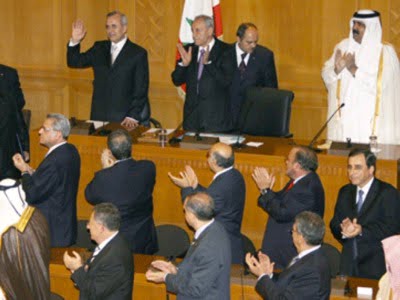
Qatari Emir Atari Hamad ben Khalifa Al Thani came to inaugurate « President » Sleimane as the replacement for his predecessor Emile Lahoud, who was not even invited. During the ceremony at the Lebanese National Assembly, French Minister for Foreign Affairs Bernard Kouchner was seated not on the public benches, but on the benches of the Lebanese government. He expressed his irritation when the ex-President of the Assembly observed that article 49 of the Constitution forbade a Chief of Staff to become President less than two months after he had left military service. No-one took the time to modify the text, and the deputies elected Michel Sleimane in violation of the Constitution.
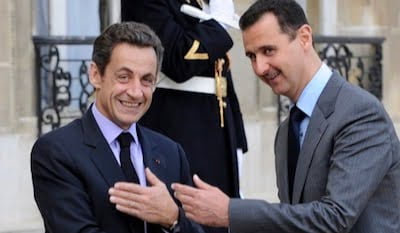
In July 2008, Nicolas Sarkozy launched the Union pour la Méditerranée (Union for the Mediterranean), a vast operation intended to compete with its European partners and also to reinstate Israël in the concert of regional nations. For the occasion, Lebanon and Syria finally reactivated diplomatic relations (which had been entirely absent since their separation by the French in 1943), while Sarkozy invited both Bachar el-Assad and his Israëli counterpart, Shimon Peres, to take part in the 14th July parade on the Champs-Elysées. The former carefully avoided the latter.
The Union pour la Méditerranée (UPM) failed for the same reasons as the Barcelona Process initiated by the European Union – it is impossible to unite all the actors of the region as long as the Israëli conflict has not been resolved.
Sarkozy made a second official visit to Syria in January 2009. Contacted by the Obama administration, the French President abstained from deciding anything at all. It was simply a scouting trip.
(To be continued …)
References:
[1] L’Effroyable Imposture, Thierry Meyssan, préface du général Leonid Ivashov, Demi-Lune (2002). English Version: The Big Lie, Carnot (2002).
[2] “Coup d’Etat in Haiti”, by Thierry Meyssan, Voltaire Network, 5 March 2004. « Paris relâche le président haïtien », par Thierry Meyssan, Réseau Voltaire, 16 mars 2004.
[3] “Revelations on Rafik Hariri’s assassination”, by Thierry Meyssan, Оdnako (Russia) , Voltaire Network, 29 November 2010.
[4] “Operation Sarkozy : how the CIA placed one of its agents at the presidency of the French Republic”, by Thierry Meyssan, Voltaire Network, 26 July 2008.
[5] Author’s statement to Judge Tournaire, March 24, 2018. Avec les compliments du Guide. Sarkozy-Kadhafi – l’histoire secrète, Fabrice Arfi et Karl Laske, Fayard (2017).
[6] « M. Sarkozy aurait organisé la fuite de Mohamed Zuhair As-Siddik », Réseau Voltaire, 16 avril 2010.
By Thierry Meyssan
Source: Voltaire Network

